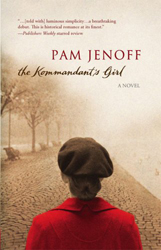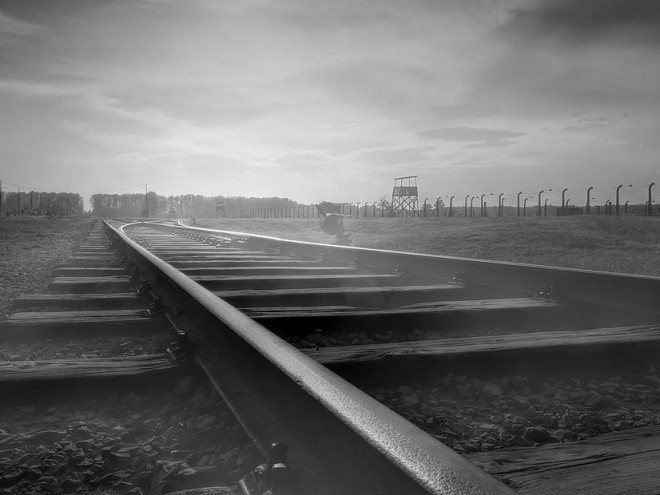In this three-part series for the Visiting Scribe, internationally bestselling novelist Pam Jenoff explores how her years in Poland changed her life and led her to writing books. Earlier this week we featured Part I: Living the War, which you can read here.
 I came back from my years in Poland profoundly changed by what I had experienced. I knew I wanted to write a book about my time in Poland. And not just any book; I knew it would be a novel. How did I know? Because I was one of those little kids who always wanted to be a writer, scribbling down stories and showing them to anyone who would listen. And it was never short stories or poetry, always novels.
I came back from my years in Poland profoundly changed by what I had experienced. I knew I wanted to write a book about my time in Poland. And not just any book; I knew it would be a novel. How did I know? Because I was one of those little kids who always wanted to be a writer, scribbling down stories and showing them to anyone who would listen. And it was never short stories or poetry, always novels.
I took a course at Temple night school called “Write Your Novel This Year” (seriously) and began to write. I began with a scene of a young woman crossing Krakow’s main market square with a small child during the war. As I wrote, I discovered that she was a Jew in hiding and she was protecting this child of great rabbinic lineage.
Then the most serendipitous thing happened: I was on a train from Washington to Philadelphia when I met two very well-known Holocaust survivors, man and wife. (I’ve never publicly named them because the man has since passed on and I never got to ask if he minded.) I was telling them about this novel I was writing set during the war, and the woman said, “Surely you know the story of the Krakow resistance.” I stopped, dumbfounded. We all know the story of the Warsaw uprising. But I had just come back from two and a half years of living in Krakow, working on Holocaust issues, and I had never heard of the Krakow Jewish resistance. I went back to Poland for more research and I was amazed to discover a rich history of Jewish uprising on the very streets where I had lived and worked (a history which is largely unknown, since virtually everyone who was a party of the resistance in Krakow perished during the war.) This true story of the Krakow resistance became the inspiration for my first novel, The Kommandant’s Girl.
Even after honing my topic, the actual decision to persist in writing a novel set during the war so did not come easily. I wrestled with a huge sense of inadequacy for the subject I was addressing. I remember watching Band of Brothers (which I consider the finest thing ever put on film) and there was a scene where they were liberating the camps, and I thought, “Who am I to be writing dinner parties and scenes at the symphony, when such atrocities were taking place 60 kilometers away?” Because, I concluded, such merriment really did persist during the war, and showing that is part of painting the bigger picture.
There is, of course, the larger issue of whether we should be writing stories set during the Holocaust at all. I’m often asked at talks whether by fictionalizing the Holocaust, we are feeding into the Holocaust deniers. I think just the opposite: that by not telling the stories we would be stifling the dialogue, which is exactly what the Nazis would have wanted.
Once one decides to write a book set during the Holocaust, there is the huge question of “getting it right.” This means both the details of historical accuracy (readers armed with Wikipedia will surely let you know if you haven’t) and also bigger questions of portraying different peoples and their roles.
For this latter question, there is no right answer. Take, for example, the question of the Poles during the Holocaust. In my work, I try to show the gray areas in people: the Jews in my book are flawed, the Germans are real people and the Poles are good and bad and between. As a result, I get e‑mails saying I’m too hard on the Poles and e‑mails saying I’m too easy on them. You get the idea.
I’ve written several novels set during the war now and it doesn’t get any easier. But I try to approach all of it with respect and dignity and I think readers respond to that. To me, each book is a love song to Jewish Poland, and the Jews of Central and Eastern Europe.
Pam Jenoff is the internationally bestselling author of six novels, including The Kommandant’s Girl. Her latest is The Winter Guest, which will be published August 26, 2014. A graduate of GWU, Cambridge and Penn Law, Pam formerly worked at the Pentagon, as a diplomat for the State Department and as an attorney. She lives outside Philadelphia with her husband and three children where, in addition to writing and speaking, she is on the faculty of Rutgers Law School.
Related Content:
- A Thousand Darknesses: Lies and Truth in Holocaust Fiction by Ruth Franklin
- Reading List: Pam Jenoff
- Essays: On the Holocaust
- Reading List: Historical Fiction
Pam Jenoff is the author of several books of historical fiction, including The New York Times bestsellers The Lost Girls of Paris, The Orphan’s Tale, The Diplomat’s Wife, and The Woman With the Blue Star. Her novels are inspired by her experiences working as the Special Assistant to the Secretary of the Army at the Pentagon and as a diplomat for the State Department in Poland. These positions afforded Pam a unique opportunity to witness and participate in operations at the most senior levels of government and provided expertise regarding World War II and the Holocaust for Pam’s books.



